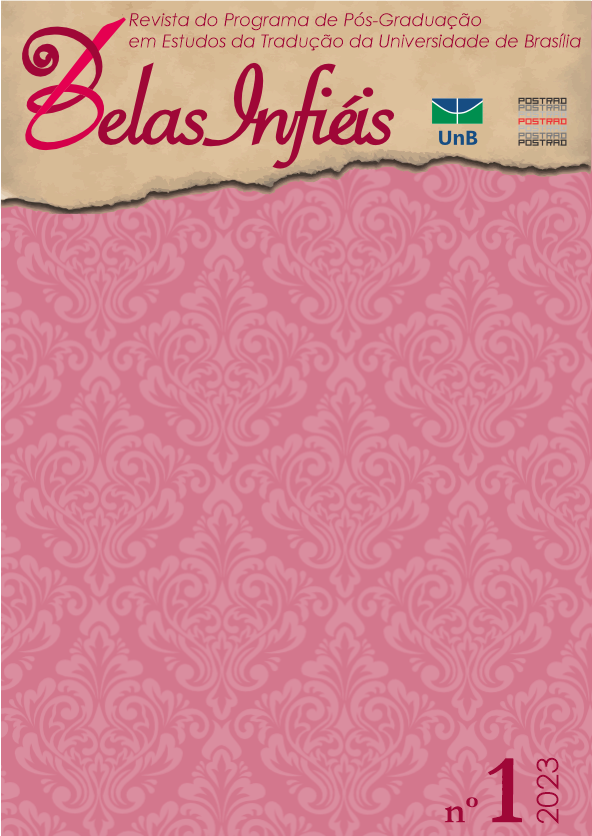“Preparing the Ground”: Introductory Words to the Translation of Don Kiraly’s Text (2012), Growing a Project-Based Translation Pedagogy: A Fractal Perspective
DOI:
https://doi.org/10.26512/belasinfieis.v12.n1.2023.46755Keywords:
Don Kiraly. Translation Pedagogy. Translated article.Abstract
This article traces a fractal path through educational psychology and philosophy in an attempt to elucidate an arborescent perspective of complementary inter-disciplinary sources of inspiration for a project-based translation pedagogy. Starting with a socialconstructivist, project-based approach proposed at the turn of the millennium, an attempt is made to paint a broader picture of the synergistic influences underlying an emerging “holistic-experiential” approach to translator education. Post modernism, enactive cognitive science, complexity theory, transformational educational theory and social-constructivist epistemology are some of the complementary roots that can be seen as potential sources of inspiration to nourish a learning-centered approach to developing translator expertise in institutional settings.
Downloads
References
Bereiter, C., & Scardamaglia, M. (1993). Surpassing Ourselves. Open Court.
Bruffee, K. (1995). Collaborative Learning. Johns Hopkins University Press.
Bruner, J. (1960). The Process of Education. Harvard University Press.
Davis, B. (2004). Inventions of Teaching: A Geneology. Lawrence Earlbaum Associates.
Davis, B., Sumara, D., & Luce-Kapler, R. (2000). Engaging Minds: Learning and Teaching in a Complex World. Lawrence Earlbaum Associates.
Dewey, J. (1938). Experience and Education. Simon and Schuster.
Duffy, T. M. (2009). Building lines of communication and a research agenda. In S. Tobias, & T. Duffy (Orgs.), Constructivist Instruction: Success or Failure (pp. 351–367). Routledge.
Echeverri, A. (2008). Énième plaidoyer pour l’innovation dans les cours pratiques de traduction. Préalables à l’innovation? TTR, 21(1), 65–91.
Fenwick, T., & Tennent, M. (2004). Understanding Adult Learners. In G. Foley (Org.), Dimensions of Adult Learning (pp. 55–73). Allen & Unwin.
Hurtado Albir, A. (2008). Compétence en traduction et formation par compétences. TTR, 21(1), 17–64.
Kiraly, D. (1995). Pathways to Translation. Kent State University Press.
Kiraly, D. (2000). A Social Constructivist Approach to Translator Education. St. Jerome.
Kiraly, D. (2005). Towards Postmodern Translator Education: from Transmission through Construction to Emergence. Meta, 50(4), 1098–1111.
Kiraly, D. (2006a). Beyond social constructivism: complexity theory and translator education. Translation and Interpreting Studies, 6(1), 68–86.
Kiraly, D. (2006b). Sprachmittlung in einer komplexen Welt: Die Übersetzerausbildung im Wandel. In G. Wotjak (Org.), Quo vadis Translatologie? Ein halbes Jahrhundert universitäre Ausbildung von Dolmetschern und, eds. Übersetzern in Leipzig. Rückschau, Zwischenbilanz und Perspektiven aus der Außensicht (pp. 191–204). Frank und Timme.
Kiraly, D. (2008). Transcultural relating: An example of project-oriented translator education. Studia Universitatis Babes-Bolyai – Philologia, 3, 5–10.
Kiraly, D. (2009). Acknowledging learning as enaction: moving beyond social constructivism towards empowerment in translator education. In C. Laplace, M. Lederer, & D. Gile (Eds.), La Traduction et ses métiers (pp. 179–191). Caen: Lettres Modernes Minard.
Kiraly, D. (2010). Emergence in the language classroom: An experiment in facilitated language acquisition. In H. Lee-Jahnke, & E. Prunč (Orgs.), Am Schnittpunkt von Philologie und Translationswissenschaft, Festschrift zu Ehren von Martin Forstner (pp. 109–119). Peter Lang.
Lakoff, G., & Johnson, M. (1980). Metaphors We Live By. University of Chicago Press.
Maturana, H. R., & Varela, F. (1992). The Tree of Knowledge. Shambhala.
Prechter, R. (2004). The fractal nature of the stock market: the human social experience forms a fractal. In N. Lesmoir-Gordon (Org.), The Colours of Infinity: The Beauty, Power and Sense of Fractals (pp. 128–139). Clear Press.
Risku, H. (1998). Translatorische Kompetenz: Kognitive Grundlagen des Übersetzens als Expertentätigkeit. Studien zur Translation, 5. Tübingen: Stauffenburg.
Schon, D. (1987). Educating the Reflective Practitioner. Jossey-Bass.
Tudor, I. (1992). Learner-centredness in language teaching: finding the right balance. System, 20(1), 31–44.
Wood, D., Bruner, J., & Ross, G. (1976). The role of tutoring in problem solving. Journal of Child Psychology and Psychiatry, 17(2), 89–100.
Vygotsky, L. (1994). Extracts from Thought and Language and Mind in Society. In B. Stierer, & J. Maybin (Orgs.), Language, Literacy and Learning in Educational Practice (pp. 45–58). Multilingual Matters.
Downloads
Published
How to Cite
Issue
Section
License
Copyright (c) 2023 CC BY

This work is licensed under a Creative Commons Attribution 4.0 International License.
Given the public access to this journal, the texts are free to use but requires the recognition of the original authorship and initial publication in this journal to be properly stated.
 The journal allows the use of works published for non-commercial purposes, including the right to submit the work to publicly accessible databases. Published contributions are the sole and exclusive responsibility of the author(s).Â



















